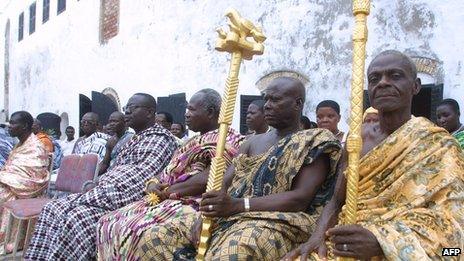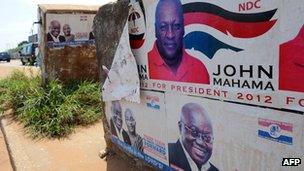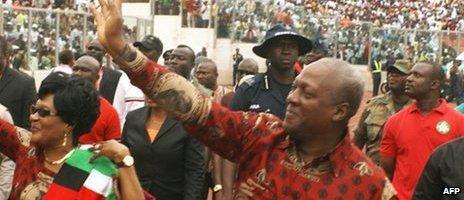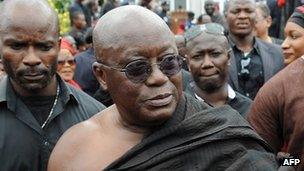African viewpoint: Election campaigns, Ghana-style
- Published
- comments

Chiefs wield enormous influence in Ghanaian politics
In our series of viewpoints from African journalists, Elizabeth Ohene - a former government minister in Ghana and a member of the opposition New Patriotic Party (NPP) - writes about how deceptive election campaigns can be.
We are in the midst of furious campaigning ahead of presidential and parliamentary elections on 7 December.
Every available space is covered with billboards, posters and flags.
As there are eight presidential candidates, the number of posters that can be squeezed around one light pole on a street is best left to the imagination.
The decibel level around the country generally has gone up and we cannot hear each other talk or, if truth be told, we do not want to hear each other because, to quote a friend, our minds are made up and we do not want to be confused with facts.
Wholeheartedly supporting everyone
Political campaigning in Ghana has its own rules and quirks.

President John Mahama's main challenger is Nana Akufo-Addo (below)
The political parties are running advertisements in the newspapers, on radio and television like they do everywhere else but nobody really knows if the adverts change anybody' s mind.
It is imperative, however, that you get a very catchy piece of music to accompany whatever message you are trying to convey to the people.
You can have the most well thought out programme for dealing with the many woes that afflict our nation, but if you do not have a catchy tune, you are not going to make any headway.
But if you want to know what political campaigning really is, then you have to follow a parliamentary or presidential candidate for a day or two.
Each day starts early, very early. The candidate is at the chief's palace at 05.30 because he is obliged to see the chief and get permission before he can campaign in his town or village.
The candidate presents the obligatory two bottles of gin or schnapps and a token sum of money to the chief who then assures the candidate of his wholehearted support.
This is all very well really for as long as the candidate understands that the chief will be giving his wholehearted support to every other candidate that comes to his door.
That is the way it works here, in much the same way as there is no guarantee that the people who are scrambling for T-shirts bearing a particular candidate's image will necessarily vote for him.
What's in a slogan?
These T-shirts are very popular and the Chinese are currently making a roaring business supplying them to all the parties.

President John Mahama is facing a challenge from seven candidates
I can state from personal experience that the enthusiasm from crowds to get and wear your T-shirt does not translate into votes.
Eight years after a doomed campaign in which the number of T-shirts I made, and which were fought over, far outnumbered the number of votes I got when I contested the Ho West parliamentary seat in the Volta region, I still see my T-shirts being worn at the most unexpected places.
As for issues, in these elections, we seem to be back to the time of the first ever political campaign in this country leading to independence in 1957.
At that time, the established party, the United Gold Coast Convention (UGCC), campaigned on the slogan "Independence as soon as possible" and the new party, the Convention People Party (CPP), founded by Kwame Nkrumah, used the slogan "Independence now".

Free education is a campaign promise of opposition candidate Nana Akufo-Addo
This year, Nana Akufo-Addo, the presidential candidate of the NPP, says if elected, the government would offer free education up to secondary school level - the term is Free SHS.
Free SHS, like independence, is accepted as a good idea by all, but since the ruling party, the National Democratic Congress (NDC), cannot be seen to agree with what looks like a vote-winning idea for the opposition, they are finding ways to thrash their opponents without touching the policy.
So here we are, some 50-something years later and campaigning slogans have not changed very much: It is Free SHS Now, against Free SHS as soon as possible.
If you would like to comment on Elizabeth Ohene's column, please do so below.